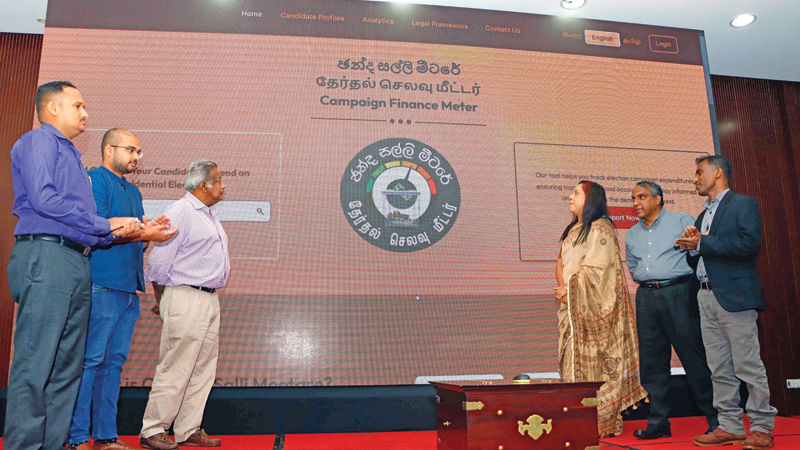 Fredrick E. de Silva (UNP) contested the Kandy by-election held in May 1948 after his father, George E. de Silva, the first Cabinet Minister of Industries and Fisheries in independent Sri Lanka, lost his parliamentary seat less than a year into his tenure due to an election petition filed by his rival, T.B. Ilangaratne.
Fredrick E. de Silva (UNP) contested the Kandy by-election held in May 1948 after his father, George E. de Silva, the first Cabinet Minister of Industries and Fisheries in independent Sri Lanka, lost his parliamentary seat less than a year into his tenure due to an election petition filed by his rival, T.B. Ilangaratne.
Ilangaratne (Independent) won the by-election, but an election petition was filed requesting to cancel the vote, alleging that Ilangaratne’s supporters made false statements harmful to candidate Fred de Silva in public meetings and through newspapers. Finding that Ilangaratne had contravened election laws at this instance, the Supreme Court stripped him of his civic rights and revoked his appointment as a Member of Parliament (MP) in February, 1949.
There was another interesting episode to this case. During the hearing, it was revealed that, Fred de Silva had paid one Ganeshan Rs. 40 to translate his election manifesto, which was originally in English, to Tamil, and that amount was not included in de Silva’s election expenditure statement.
De Silva told the Court that when he requested the translation, he had no intention of paying Ganeshan, as he considered him a friend and campaign supporter. He, therefore, said that it was not listed as debt in his return of election expenses, but when Ganeshan later asked for payment after losing his job in a newspaper, he readily paid him.
Judge Nagalingam decided that Fred de Silva had committed an offence under that Ceylon (Parliamentary Elections) Order-in-Council 1946. Pronouncing the judgement in April, 1949, the Judge made the following remarks:
 “I do not think that the very salutary provisions of the Order-in-Council should be whittled away by relaxing their stringency, for by doing so the Court will only be encouraging laxity on the part of candidates, leading to the purity of elections being grievously assailed.”
“I do not think that the very salutary provisions of the Order-in-Council should be whittled away by relaxing their stringency, for by doing so the Court will only be encouraging laxity on the part of candidates, leading to the purity of elections being grievously assailed.”
As both the leading candidates, Ilangaratne and de Silva, were disqualified, another by-election took place in June, 1949, where both of them could not contest. Tamara Kumari Ilangaratne, Ilangaratne’s wife, contested and won this by-election.
(Sources: LawNet of the Justice Ministry and ‘Judicial Decisions Related to Elections’, authored by Attorney-at-Law Jagath Liyana Arachchi and published by PAFFREL in August 2022.)
Such progressive law prevailed on the regulation of election campaign expenses at the time of gaining independence. All candidates were required to submit a report of their election expenses within a month after the results are announced. Candidates were not allowed to sit in Parliament (then House of Representatives) without submitting these reports.
These provisions were repealed by the Parliamentary Elections Act introduced in 1981. Thereafter, in the absence of a law governing campaign spending, it had been free for all for 40 odd years till the Regulation of Election Expenditure Act (REEA) came into place in 2023.
Spending spree
Running for elected office is indeed a costly affair in Sri Lanka. The more one can spend the more visibility that individual gets in the electorate, placing him/her ahead of others in the election race from the word go. It is common knowledge that candidates with deep pockets often flout the election law to generously distribute election hand-outs and freebies, especially among low-income groups in their constituency. Then where is a level-playing field for all candidates? Where do these monies come from?
With an all-important Presidential Election around the corner, now is a perfect time to reflect on these realities. As election fever grips the nation, nobody has been able to escape the in-your-face campaigns that fill the air from day to night. New posters are pasted up over one another before the glue even dries, campaign advertisements appear on large roadside digital screens, full-page colour advertisements dominate newspapers, boosted content floods social media, and campaign rallies are held across the country.
However, business as usual is going to be difficult this time around as the new campaign finance law, which is implemented for the first time in the upcoming Presidential Election, has set limits and rules to keep track of candidates’ money.
Caps and controls
Under the REEA, the Election Commission last week announced a cap of Rs 1.87 billion (Rs. 109 per voter) on campaign spending for each candidate, after careful deliberation with Presidential aspirants and their representatives.
In addition, candidates are prohibited to accept donations from government entities, foreign governments, international organisations, foreign companies, Sri Lankan companies with significant foreign ownership, and anonymous donors. Candidates must submit a report detailing all donations received and expenses incurred to the Election Commission within three weeks of the election results. Failing to do so, or knowingly providing false information, is considered an illegal practice under the electoral law.
“The financial reports submitted by candidates will be displayed publicly for 10 days. If any candidate is found to have overspent, their office can be revoked through a court decision,” Election Commissioner General Saman Sri Ratnayake said.
“Adequate campaign finance is important for a successful election bid, but money should not dominate the whole process. The voters should not be treated as consumers. Only the marked ballot paper needs to remain secret in an election; everything else has to be transparent,” he stressed.
Ratnayake said that government stakeholders such as the Inland Revenue Department, National Audit Office, Human Rights Commission, Police and the Bar Association have teamed up with the Election Commission on the future course of action related to campaign finance regulation.
The Commissioner General made these observations taking part in a recent event at the BMICH for the launch of “Chanda Salli Meetare”, the first-ever campaign finance observation tool in Sri Lanka, a collaborative effort of six prominent election watchdogs.
Tracking campaign costs
Transparency International Sri Lanka (TISL), People’s Action for Free and Fair Elections (PAFFREL), Campaign for Free and Fair Elections (CaFFE), Centre for Monitoring Election Violence (CMEV), Hashtag Generation, and the Institute for Democratic Reforms and Electoral Studies (IRES) have established this online tool to track the campaign expenditures of candidates, starting from the Presidential Election 2024. The tool is designed to supplement the Commission’s campaign finance regulatory work.

Money in politics should not define the winning candidate
Addressing the launch event, TISL Executive Director Nadishani Perera explained how the joint mechanism works. “A dedicated team is closely observing the social media and mainstream media-based campaigning, and election observers have been deployed across the country to gather information on ground-level election expenditures.
Once verified, the data will be published on the website,” she noted, also reminding that the election watchdog groups have undertaken this additional task alongside their regular election observation work.
The website
‘chandasallimeetare.lk’ features profiles of all candidates in the Presidential race with insights on their campaign expenditure broken down into selected cost categories namely; mainstream media, social media, billboards and cut-outs, public events, press conferences, launch ceremonies, and campaign offices.
Citizens can also provide information about campaign activities in their respective areas through this online platform. Campaign expenditures are calculated based on pre-determined minimum average costs and formulas for each category.
“When candidates submit their returns to the Election Commission, those can be cross-checked with the findings reported through the website. On the other hand, the real-time data provided by this tool helps voters to make more informed voting decisions,” the Executive Director added.
Money’s grip
She highlighted the importance of the campaign finance law, also observing that the upcoming Presidential Election would be a litmus test for the effectiveness of the new law. “The bitter truth is that no-strings-attached campaign funding is hard to find nowadays. The donors, whether they be individuals or companies, often expect special favours once the candidate is elected. By imposing restrictions, the campaign finance law minimises this risk and enables public representatives, once elected, to focus on serving their constituents without being swayed by external parties” she added.
PAFFREL Executive Director Rohana Hettiarachchi underlined how limitless election expenditure breeds corruption and bribery. “Once elected, many public representatives resort to illegal means to recoup the money spent on their campaigns, and allow their donors to do the same. They do not truly represent the people. The core values of democracy are lost in an election process where money comes to the centre,” he said.
Observing that all candidates have to submit their financial returns despite they win or lose, Hettiarachchi called on public institutions like the Commission to Investigate Allegations of Bribery or Corruption (CIABOC) and the Inland Revenue Department to closely follow those reports.
“Check where the money came from, whether due taxes have been paid, and whether it was earned through proper channels. I bet such interventions will yield more revealing information,” he said.
The PAFFREL chief cautioned that if the country adopts a mixed-member proportional representation system, as currently on the table, imposing a cap on campaign expenditure is a must to prevent ‘vote buying’.
In a nutshell, free and fair elections are the cornerstone of democracy. Do not let the money in politics undermine it. The citizens’ responsibility does not end with the vote.
Their continuous engagement in the governance process is key to ensure that elected representatives remain accountable.









